Making it rain…Chinese Red Packets

When it comes to China’s New Year celebrations, the traditional greeting is no longer “Happy New Year” but “How many digital red packets did you get?” With 409,000 digital red packets sent and received every second via smartphones this year, I hope you got quite a few.
The gifting of red packets filled with money, or “hongbao”, is an ancient Chinese New Year tradition with roots back to the Qin Dynasty (221 BC-206 BC). The red colour symbolizes luck and is supposed to fend off evil spirits. Every year, millions of packets are exchanged between friends, colleagues, and loved ones.
The only change is that nowadays, the gift giving is taking place on smartphones.
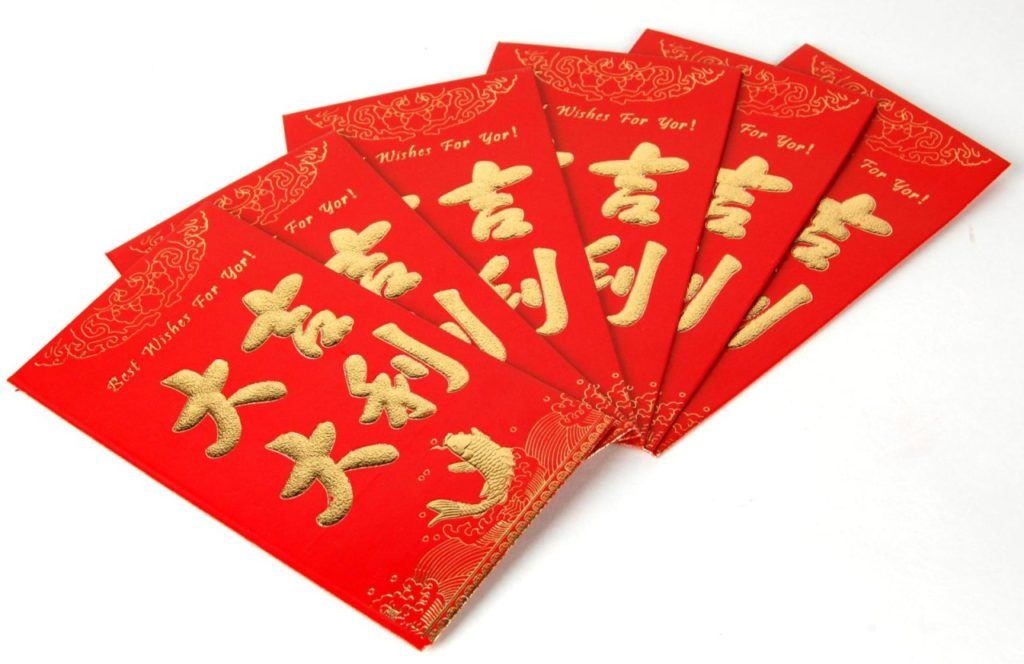
The internet has transformed this centuries-old practice into a virtual online gifting festival, with 8.08 billion digital red envelopes sent on a single platform last New Year’s day alone. [1] Originally devised by China tech giant Tencent and its messaging app “WeChat” in 2014, this digital phenomenon has grown in magnitude every year, with all of China’s leading internet companies – Baidu (China’s Google/Yahoo/etc.), Alibaba (China’s Amazon/eBay/PayPal/etc.) and Tencent (China’s Facebook/Zynga/WhatsApp/etc.) now competing for pocket-share.
Even the Chinese government has jumped on board, teaming up this year with e-commerce titan Alibaba to create the “reddest” of red packets, gifting $50,000 in cash[2] through a lucky draw. To enter, participants simply needed to recite a chosen socialist catchphrase from President Xi Jinping’s 2016 New Year Speech, which was repeatedly broadcast on national television during the traditional festivities. This year’s choice lucky phrases included: “You will earn what you worked for” and “As long as we persevere, dreams will come true”.
Evidently, political propaganda can be digitalised too.
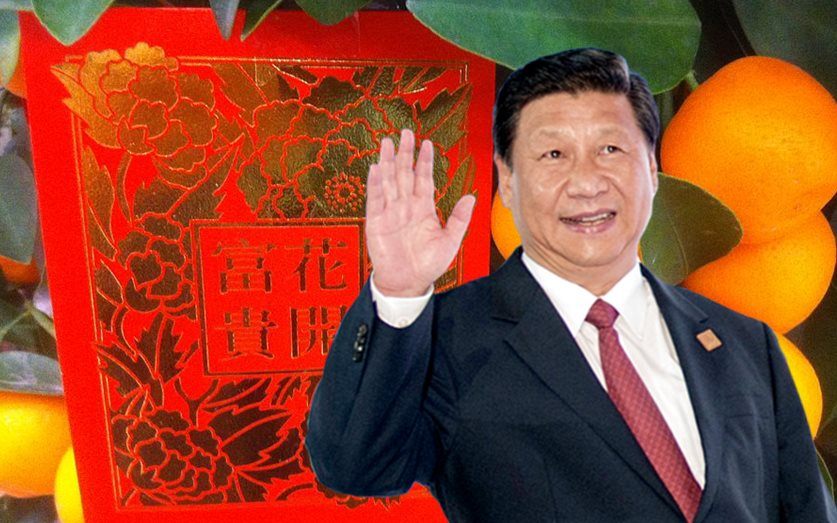
How does it work?
Taking market-leader WeChat as an example, senders must first download the app and link it to their bank account. After depositing a lump-sum into their “wallet”, the user then decides whether to gift fixed amounts to each recipient, or to opt for a “lucky draw” format, whereby WeChat randomly allocates different sums of money to each of your chosen recipients. With gambling still officially illegal in China, this game-like twist added an addictive element to the process likely contributing to its viral spread. At the peak of activity this year, 1.7 million envelopes were opened every minute.[3]
While the companies do not appear to directly profit from the service (there are no transaction fees), such promotions contribute hugely to user growth and retention, requiring users to not only download the app, but to upload bank cards, personal details, and share the site with friends and family. In response to WeChat’s initial launch, Alibaba Founder Jack Ma reportedly described it as a “Pearl Harbor-like attack” on its Alipay payment service.
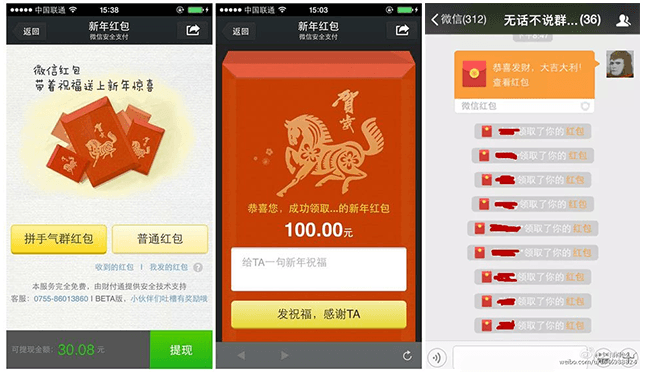
Competitors to Tencent
Since the advent of digital hongbao in 2014, new players have quickly entered the market with increasingly innovative ploys to attract users. This year Weibo, owned by Sina.com and in partnership with Alipay, teamed up with thousands of corporate sponsors to offer US$80 million worth of monetary prizes and physical gifts, including Prada bags and iPhones, in exchange for brand exposure. The mammoth interactive giveaway took place during the government’s five-hour New Year’s state television gala, with watchers simply needing to shake their smartphones at certain points through the show. At its peak, Weibo recorded 800 million “shakes” per minute.
Another innovative feature has been the ability to send gifts to popular celebrities, with one Chinese boyband receiving hongbao from over 6,500 fans within ten hours. Gift services have also become popular, with credits for activities like traditional lion dance performances, taxi credits (at China’s “Uber”), or appointments with religious practitioners or doctors. Recently Western brands have been trying to get in on the action, with Pepsi, Burberry and McDonalds amongst those who have actively sought a relationship with WeChat.
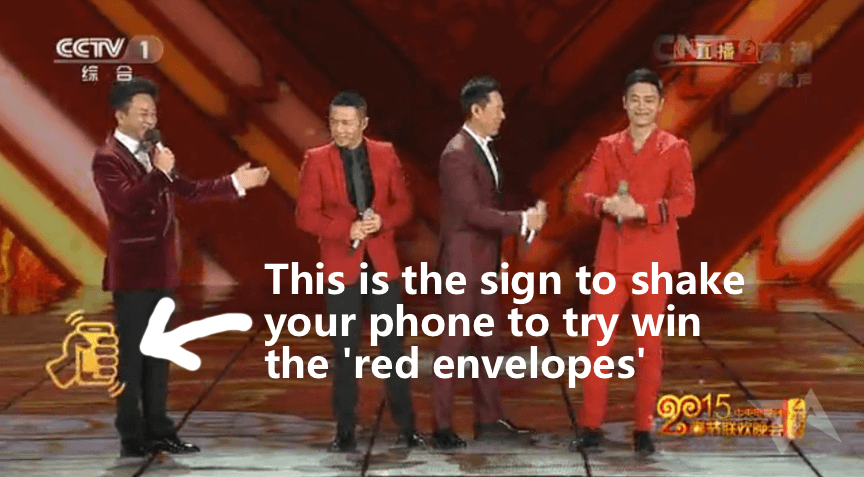

The biggest threat: Corruption crackdown
While digital gifting seems here to stay, the biggest risk is China’s crackdown on corruption, with the digital hongbao not only difficult to track, but tricky to define as bribes, given the seasonal period in which they are sent.[4] Remaining on good terms with Beijing lawmakers will be critical, along with swift compliance to any regulations that emerge.
Conclusion: “Even grandma is ditching hongbao for digital red envelopes”
There is no question that the internet has irreversibly transformed the face of traditional Chinese gift-giving. As one user exclaimed: “Hongbao are usually given to children by parents or older relatives, but the Internet has made the activity a universal pastime”.[5] At the same time, digital hongbao have revolutionized the way Tencent and other major tech companies tap into the wallets of millions of Chinese consumers, and have created a totally new channel for direct marketing. Clearly this trend is here to stay.
When you celebrate the Chinese New Year of the Rooster hongbao on January 28th next year, feel free to add me on WeChat: @pippalamb/林珮珮.
Words: 772
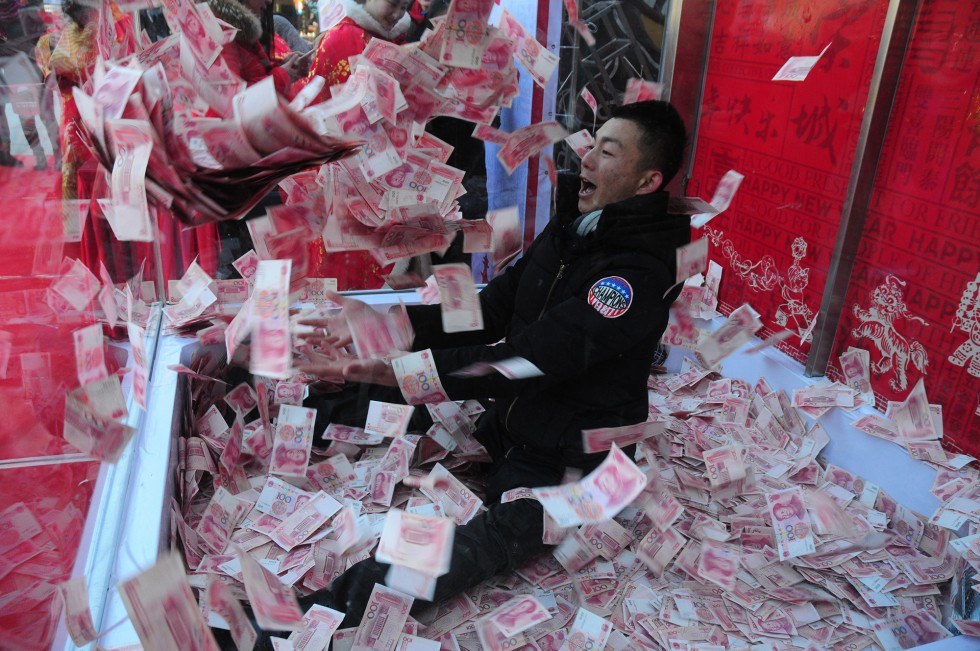
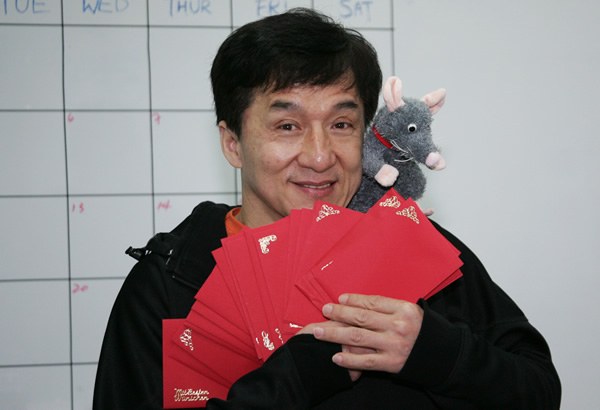
Footnotes:
[1] February 7 marked the date of the Chinese Lunar New Year festival in 2016, when 8.08 billion digital red envelopes were sent on WeChat alone. http://shanghaiist.com/2016/02/09/8_billion_hong_bao_through_we_chat.php
[2] http://www.scmp.com/tech/apps-gaming/article/1909814/reddest-red-envelope-chinese-communist-party-teams-alibaba-tencent
[3] http://www.shenglidigital.com/blog/wechat-red-envelope-campaign/
[4] http://digital.asiaone.com/digital/features/beware-ill-effects-digital-hongbao
[5] Wan Jianzhong, a folklore expert with Beijing Normal University, said the hongbao is a sign of “traditional culture evolving in the Internet era”. http://english.sina.com/china/2015/0225/785946.html
Web sources:



Pippa, I loved this post! I also am sad that it has been forever since I’ve received a hongbao, wonder if I should be more active on WeChat to remind my relatives that I am not yet too old to receive money on Chinese New Year…a few questions:
1.) The appeal of electronic hongbao for companies such as WeChat seems to be driving more people to its platform. Do you think there is room for companies to profit off of this though? Should they eventually start charging for certain types of transactions (e.g. certain monetary amounts)?
2.) Given the privacy concerns, are electronic hongbaos something that only a large company like Tencent or Alibaba would be able to successfully full off? Or could a niche player enter the market (maybe something like a Venmo that is focused on sending money)?
3.) What are the biggest risks facing electronic hongbao? How likely do you think the government will intervene and what would trigger such an intervention?
Hey Joanna! Fire up that wechat account, it sounds like you could be a direct beneficiary of the above story. Lol. As mentioned, I’m recommending all readers do the same (FYI @pippalamb).
1.) For now I see it as a land-grab between BAT – Baidu/Alibaba/Tencent – (and a few others like Sina who are getting in via one of the big three) – evidenced by the aggressive response to WeChat’s invention of the original hongbao app in 2014. Jack Ma couldn’t have been more blunt that he saw it as a direct attack on the dominance of Alipay. Certainly, if you consider BAT should be sticking to each of their respective territories (Baidu with search, Alibaba with ecommerce, and Tencent with content), Tencent was definitely treading on Alibaba’s toes here. For that reason I’d say that user growth and stickiness/retention will continue to be the driving force behind promotions like these, since the MAIN hurdle remains getting Chinese users to sign up AND upload their credit card details. If they can do that, I think the monetization of other goods and services down the line will follow. Of course after a certain saturation point they could look at different strategies, including pricing options. That said, I’d imagine providers would always be incentivised to retain SOME element of “free” when sending seasonal gifts of goodwill, for messaging reasons.
2.) – Will try to be shorter – again no, in theory anyone can build the software. The hurdle is having enough credibility and trust with users to upload bank details. For this reason, I’d think the advantage of BAT is likely to stay.
3.) Regulatory risk is the most pressing in my opinion, especially since the evolution of China’s financial system and ongoing opening up of their capital markets is an extremely sensitive subject. Just think of the problems around NPLs and where banks are being valued right now – the government is aware that international observers are waiting for a big China “crash”. The implication of this is a tighter watch on any sort of entity that is detracting control from Beijing – which yes, the rise of banking/wealth management products/financial tech apps – plays directly into. The trigger is hard to tell – probably when RMB volumes exchanged hit a certain level, or the amount of users relative to those using traditional bank accounts. Again – it’s hard to track this, but I imagine the government is doing its best to. For the both the government and the teech companies, I think it will be a case of “if you can’t beat them, join them”, and we will see some mutual collaboration. It’s sort of already started happening (e.g. the lol socialist propaganda hongbao).
Thanks for reading! A great analyst to read up on here if you can get access is Elinor Leung @CLSA.
Hi Pippa!
As Joanna, I was thinking how this companies can generate profit with this service. With 1.7 million envelopes open per minute (I can oonly imagine how much money this apps are moving), I feel there is room to monetize this service without having to charge a fee to the users for sending or receiving money.
I’m thinking of acting like a bank would. People deposit money into their checking accounts (or their app wallet), and the bank (WeChat) uses those funds to (1) invest or (2) lend it to other people. In the same way, people who receive virtual red envelopes with money, keep the funds in their checking account (app wallet), and the bank (WeChat) also profits from those funds.
Do you think a system like these can work in China? Would it be approved by local regulators?
Hi Bernadita – definitely see this as a long-term use acquisition ploy with the potential for a variety of revenue streams down the line. Lunchalot below made a great point – an easy monetisation option already in play is partnerships. Jeremy also in agreement it seems!
To your broader point about these tech companies assuming the traditional roles of banks – this is exactly why the gvt is watching financial regulation so closely – check out my comments on 3) above! Thanks for reading!
Hey Pippa
Loved the post. There’s an ongoing theme in this & in recent cases that Chinese tech firms not only understand the local culture better than Western firms, but are also highly adept at executing against these insights. 800m “shakes per minute” is a staggering amount of engagement. To compare, I note that the Superbowl had 112m viewers this year. To that end, I noticed that you referred to many of the firms as “China’s” Amazon, Google, Facebook etc. With your cross cultural perspective, do you think there’s onus on the West to take better effort to understand and appreciate these firms for what they are, and potentially look to consider whether any of their platforms would work in our own culture?
The Economist landed this point fairly recently: http://www.economist.com/news/leaders/21703371-western-caricature-chinese-internet-firms-needs-reboot-chinau2019s-tech-trailblazers
To the points raised above about monetising – perhaps the solution lies not in monetising the actual Hongbao payments, but in co-partnerships with branded sponsors. If Weibo are already partnering with corporate sponsors for giveaways during the New Year TV marathon, it doesn’t seem to be a stretch of the imagination to think that these branded partnerships can be auctioned off to the highest bidder.
Finally – can I just add that I loved the visuals, this was a really fun post to read!
Sir Lunchalot, thanks for the questions! To your first point – yes absolutely. But it can go both ways – I wouldn’t for example say that the majority of Chinese users are particularly familiar with the intricacies of Western platforms, nor are the companies themselves particularly rushing in to landgrab international users at this stage. This latter point is key though – for NOW, continued innovation and competition in their own home markets has been more than enough of a challenge, but in the future yes – it’s quite possible that continued consolidation will drive BAT to clash with their western counterparts. At that point, it becomes a lot more interesting.
In terms of Western companies learning from Chinese ones – of course and again vice versa – the issue here however is that the fundamental characteristics of the environments they are operating in are just still very different (be it regulatory, economic, social) necessitating different biases in their development. Like I mentioned on Alibaba, e-commerce in emerging markets is a very different game to e-commerce in developed markets, which tend to have a very mature offline infrastructure already in place. China is much more of a clean slate – both a good and bad thing.
Totally agree with you on the partnerships. You should go and work for Tencent.
Great post, Pippa! I love this idea – digital hongbao makes so much sense as the world continues to globalize and people don’t necessarily live near family and friends anymore. Being able to send and receive digitally is the perfect solution for families whose children have moved away and can’t be home for New Year celebrations. In reading about the various apps that offer digital hongbao, I was thinking of venmo and how it’s become a platform for friends to send very small sums of money (often less than a dollar) as a way of keeping in touch or making a joke. I wonder if this phenomenon will spread to digital hongbao; I could imagine people sending their friends silly new years messages along with very small sums of money through one of the apps. This could potentially be another way for apps like wechat to promote their brands via “word of mouth” and attract additional partnerships.
Pippa! What a good read. This movement to give electronic hongbaos is however very concerning to me. It is my understanding that hongbaos were traditionally given to bring good luck, because of the color red, and that the money inside was just a nice gesture. The fact that people are now giving “digital hongbaos” reflects a society that cares more about money than the good intent others have for them. Further, the app seems to also allow you to track how much each person has given you, and can be very easily used as a tool to judge the merits of one’s relationship. Whilst the tension of whether Chinese New Year is about celebrating with loved ones or about the gifts you receive has always been there (a similar tension surrounding Christmas), this movement to digitize hongbaos and the government’s support of that seems to place the emphasis on materialism.
Thanks for your comments and I totally get your concerns! My question however would be to what extent this rise of materialism is being driven by digitalisation, vs. China’s overall economic transition from a closed-control economy, to an open, free-market/capitalist economy. In addition, pre-digital hongbao times, when you were given a traditional red packet, you could still see how much money that person is giving you, so I don’t know if making this digital is something new. With physical hongbao, there are in fact additional concerns around materialism at play: are the notes themselves pristine, what does the packet look like, etc etc.
More broadly however, I do agree that the government needs to do some serious thought about the values being instilled in their population, especially as the proliferation of extreme wealth inequality grows. My main focus here would not be on digitisation however, but on education, and setting strong role models for the upcoming generation. I would love to discuss more (if you reveal who you are) ! Personally, I’m immensely sceptical of the current crackdown on corruption.
Definitely feels like a land grab for internet payment systems. But good to see some Chinese tradition discussed here as well.